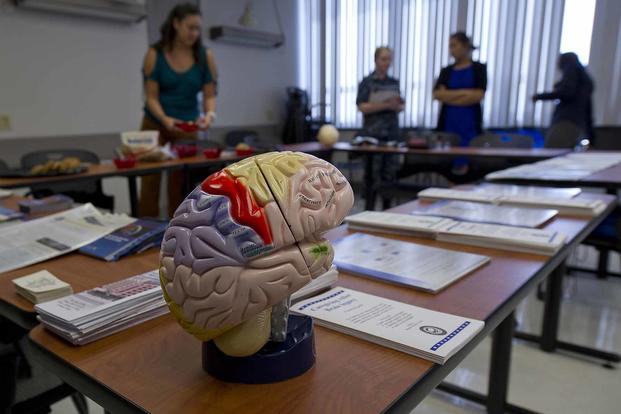Researchers in Bethesda, Maryland, are looking for caregivers and loved ones of troops and veterans with brain injury or post-traumatic stress disorder to join a years-long study on the impact of these injuries on individuals and families.
The Traumatic Brain Injury Center of Excellence, formerly the Defense and Veterans Brain Injury Center, launched the study in 2010 to examine the effects of traumatic brain injury on Iraq and Afghanistan veterans and families.
The study, now in its 13th year, is ongoing and needs caregivers of troops and veterans with traumatic brain injury, those who care for active and former service members with PTSD, and non-caregiver military family members.
Read Next: Ukrainian Vets Learn to Navigate the World with the Bodies War Has Changed
Since 2000, nearly a half million U.S. troops experienced a brain injury in combat or training, according to the Department of Defense. To date, the Caregiver and Family Member Study has found that the burden of caregiving is associated with physical and psychological distress, disrupted family life and poor sleep, in addition to other unmet health-care needs, according to the researchers, based at the National Intrepid Center of Excellence in Bethesda.
The study also has highlighted that not all caregiver experiences are negative, however. "In fact, some report high levels of satisfaction and resilience and healthy family relationships," DoD officials wrote in a 2011 article soliciting new volunteers for the research.
Researchers are recruiting family members, friends or significant others who help a service member or veteran who served after October 2001 and experienced a TBI or has been diagnosed with PTSD.
The types of assistance provided include helping with day-to-day activities such as dressing, managing emotions, flashbacks, personality changes, anger/irritability, housework, remembering things, taking medications, managing money, providing financial assistance, running errands, shopping, transportation or preparing meals, according to the release.
The study also requires volunteer spouses, parents or significant others who do not have a caregiving role for their veteran who served after October 2001, as a comparable group of peers to the caregivers.
The research is done by online surveys taken at home, requiring roughly one to two hours every year for up to 15 years. Participants may receive compensation, although in its release, the Defense Department did not provide details on the benefit.
The lead investigator is Dr. Louis French, a neuropsychologist who serves as deputy director of the National Intrepid Center. French's previous research has included studies on quality of life among troops following brain injury and symptoms of blast- and non-blast-related brain injuries in military personnel.
Those interested in joining the study may call 855-821-1469 or email dha.caregiver.study@health.mil
-- Patricia Kime can be reached at Patricia.Kime@Military.com.
Related: From Hormones to Horses: How Veterans Are Finally Getting Help for Brain Injuries











